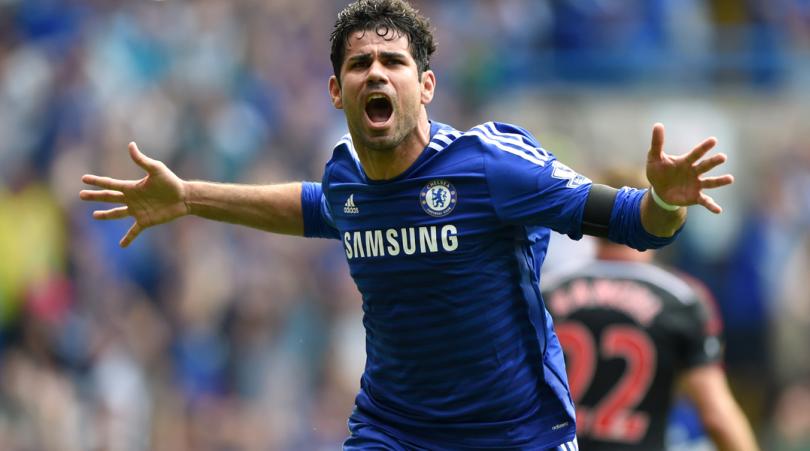Diego Costa got me in a headlock... and I thought he was charming: FFT's man on interviewing Chelsea's villain
Diego Costa’s weekend antics have sparked much outrage, and a probable three-game ban. FFT’s Andrew Murray, one of the few British journalists to have interviewed the Chelsea hitman, explains what it’s like when football’s Mr Hyde puts you into a headlock. Literally...
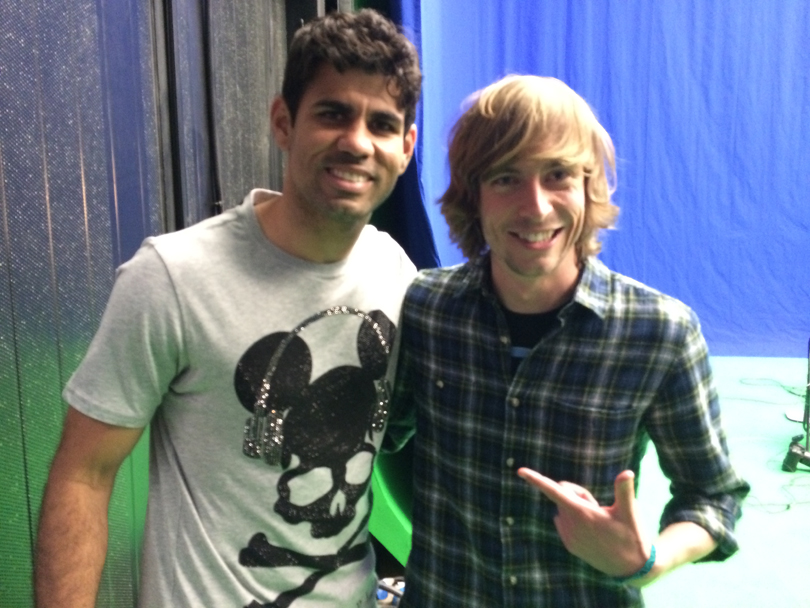
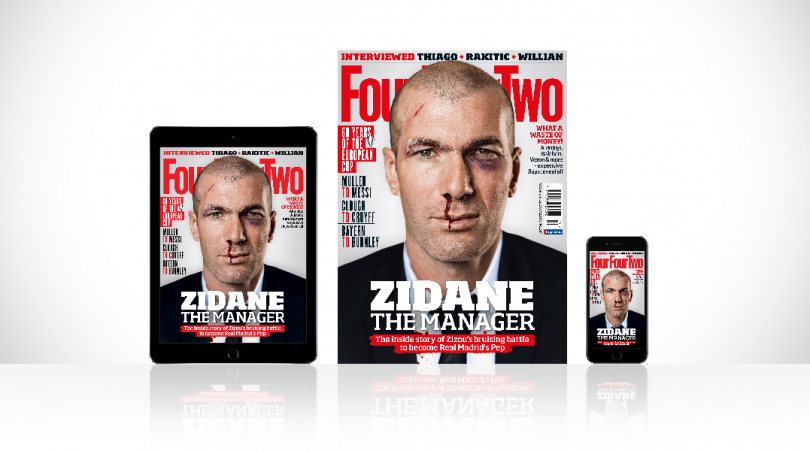
“'You’re a f***ing p***k!' Eyes narrowing, brow furrowed, Diego Costa looks about ready to hit FourFourTwo.
Stood nose-to-nose with the sturdy Atletico Madrid forward, we continue, undeterred. 'What have you ever won? Nothing. And you think you’re going to the World Cup? No chance. I’m not scared of you, you’re nothing.'
Momentarily distracted by something in our peripheral vision, FFT looks to its left. Seconds later, Costa has your reporter in a headlock, his clenched left fist haymaking its way towards the side of our temple. 'Not scared of me, eh?' booms the strapping 25-year-old. 'You should be.'”
So began my FourFourTwo interview with Diego Costa in April 2014, a couple of months before what would ultimately prove to be a harrowing first World Cup experience for the Brazil-born Spaniard.
When I was asked to inject a bit of life into Costa’s photoshoot by standing off camera and shout insults at this barrel-chested brute to incite a reaction, it’s safe to say I didn’t expect this.
He was joking, and descended into fits of laughter immediately after nearly breaking my neck, but in those five seconds I realised quite what opposition defences are subjected to every week. There was a part of him that meant the headlock, no doubt.
Costa's latest confrontation on the pitch
Get FourFourTwo Newsletter
The best features, fun and footballing quizzes, straight to your inbox every week.
Last season, Costa throttled Pablo Zabaleta, gauged Martin Skrtel’s eyes and goaded Seamus Coleman after an error. On Saturday, he (expertly) induced a red card for Arsenal’s fiery centre-back Gabriel after a coming-together and a slap to Laurent Koscielny’s face. Charged by the FA with violent conduct over that latter misdemeanour, a three-game suspension seems inevitable.
"I’m a different beast off the pitch"
I’ve got to fight to succeed. If you kick me, you’d better believe I’ll kick you back
The Chelsea striker was no different in Spain, where he has previously scrapped with Sergio Ramos, Spurs defender Fazio and Gabriel, then of Villarreal.
“I think we’d be more forgiving if we knew more about him,” said an exasperated BBC commentator Steve Wilson on MOTD2 Extra. “He hasn’t done a single interview with the English media apart from club TV.” Listen closely, Steve, because this bit concerns you.
The Costa I’ve met – a quiet, unassuming and softly spoken man with a cheeky smile and calm nature – is the Dr Jekyll to all the Mr Hyde on-field shenanigans. He’s contemplative, reflective and fiercely aware of the hardships he’s overcome – homesickness and his cousins’ own bullying of him while they sold counterfeit t-shirts in Sao Paulo – to reach the top of the game.
Far from a natural talker – even when speaking Spanish he has a strong Portuguese accent and still struggles with English – he knows football inside out and talks about the sport perceptively and with much greater interest and intelligence than almost any English footballer bar Michael Carrick.
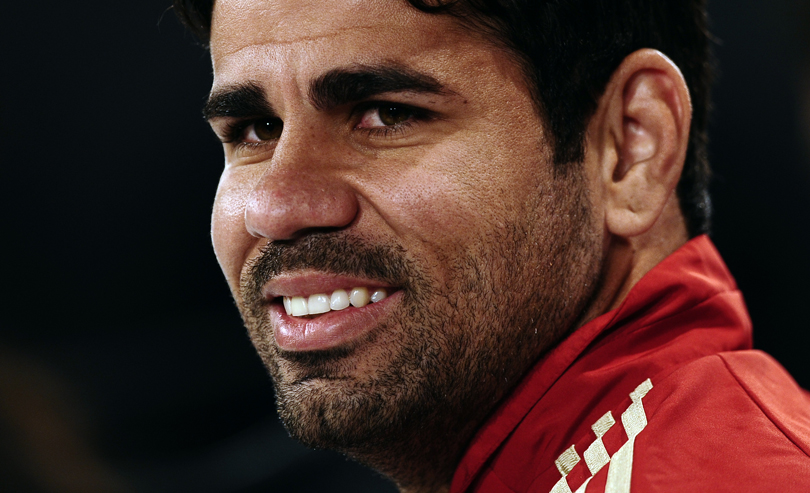
Crucially, he knows his strengths. That fire that propelled him from amateur football in Brazil, to Braga’s reserves in Portugal and four separate loans before succeeding at Atletico Madrid are vital. He has what the Spanish call mala leche, literally ‘bad milk’, but meaning a spiky, often confrontational personality. They said the same about Hristro Stoichkov.
“Look, I’ve got mala leche because I hate losing,” Costa told me in his FFT interview. His stare didn’t deviate from me for an instant. He was intense, trying to convey his point and make sure I understood his psyche’s inner workings. “I’m not the sort of guy who’s going to play football in a really calm way, it’s not my style. I’ve got to fight to succeed. If you kick me, you’d better believe I’ll kick you back.
“If the game’s quite quiet, I have to put that fire into myself. I’m a different beast off the pitch. Look at me now, I’m relaxed, I’ve got my family by my side and I’m very happy. On the pitch, I fight to continue to lead the life I have off it. Every time I score, I’m happy for myself of course, but I know it makes a lot more of the people I’m closest to in life even more happy because they depend on me for their own lives.”
Ignore him and win
The biggest influence on his career understands his protégé perfectly. “When I saw him in training, I wanted to die,” Diego Simeone, the Atleti coach under whom he exploded, once said. “He was unstoppable. Diego Costa transmits a strength which has a contagious effect on the rest of the group. People say he plays at the limit – curiously, they also said that about me.” David Beckham certainly would.
If we don’t win, then I go home and I’m f***ing pissed off. Football matches are for winning, not playing
Costa thrives on these dark arts. “Without that extra part of me, I feel there’s something missing from Diego Costa,” he told FFT. “Of course, some players prefer to ignore those shouts because that works best for them. It’s all about getting yourself in the best mindset to cause the most damage.”
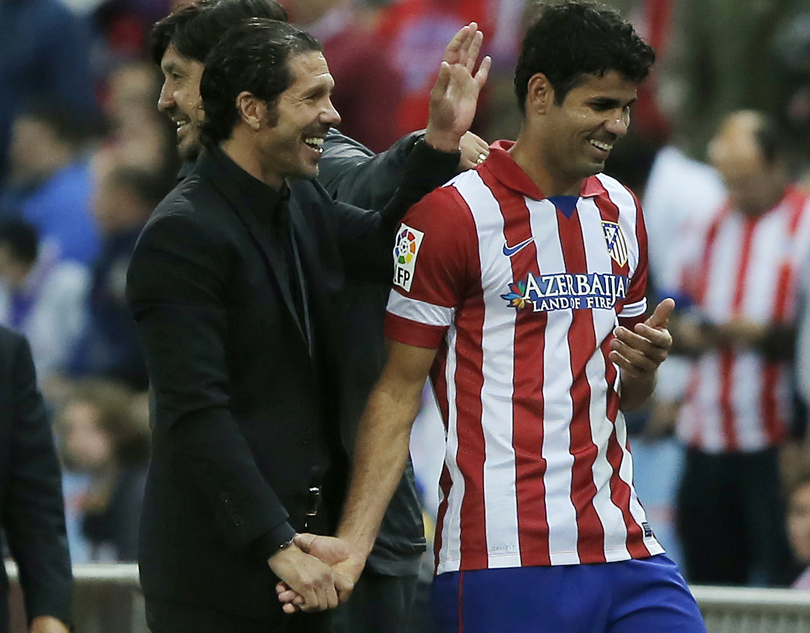
Some Premier League defenders have come to realise that the best way to combat Costa is to ignore him. Look at Koscielny last Saturday lunchtime. The Frenchman was pushed, slapped and kicked yet didn’t once react. Ignore him and Costa will work himself into such a frenzy that he’ll lose his own focus in searching out conflict. His antics against Swansea on the opening day of the season were a case in point. Ashley Williams and Federico Fernandez left Costa to his own devices and the Spaniard wound himself into arm-waving knots. Think Jack Nicholson in The Shining. “The more you shout at me,” he told FFT in that 2014 interview, “the more it increases my chances of scoring a goal.”
Diego Costa, then, is the ultimate football pragmatist, someone who will do anything to win. “If we don’t win, then I go home and I’m f***ing pissed off,” he said, half-smiling in a monotone serious way that implied many a post-game evening sat fuming on the sofa. “Football matches are for winning, not playing.”
Andrew Murray is a freelance journalist, who regularly contributes to both the FourFourTwo magazine and website. Formerly a senior staff writer at FFT and a fluent Spanish speaker, he has interviewed major names such as Virgil van Dijk, Mohamed Salah, Sergio Aguero and Xavi. He was also named PPA New Consumer Journalist of the Year 2015.
